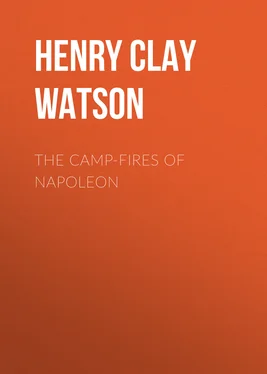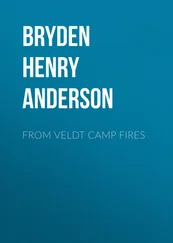Henry Clay Watson - The Camp-fires of Napoleon
Здесь есть возможность читать онлайн «Henry Clay Watson - The Camp-fires of Napoleon» — ознакомительный отрывок электронной книги совершенно бесплатно, а после прочтения отрывка купить полную версию. В некоторых случаях можно слушать аудио, скачать через торрент в формате fb2 и присутствует краткое содержание. Жанр: foreign_prose, foreign_antique, на английском языке. Описание произведения, (предисловие) а так же отзывы посетителей доступны на портале библиотеки ЛибКат.
- Название:The Camp-fires of Napoleon
- Автор:
- Жанр:
- Год:неизвестен
- ISBN:нет данных
- Рейтинг книги:4 / 5. Голосов: 1
-
Избранное:Добавить в избранное
- Отзывы:
-
Ваша оценка:
- 80
- 1
- 2
- 3
- 4
- 5
The Camp-fires of Napoleon: краткое содержание, описание и аннотация
Предлагаем к чтению аннотацию, описание, краткое содержание или предисловие (зависит от того, что написал сам автор книги «The Camp-fires of Napoleon»). Если вы не нашли необходимую информацию о книге — напишите в комментариях, мы постараемся отыскать её.
The Camp-fires of Napoleon — читать онлайн ознакомительный отрывок
Ниже представлен текст книги, разбитый по страницам. Система сохранения места последней прочитанной страницы, позволяет с удобством читать онлайн бесплатно книгу «The Camp-fires of Napoleon», без необходимости каждый раз заново искать на чём Вы остановились. Поставьте закладку, и сможете в любой момент перейти на страницу, на которой закончили чтение.
Интервал:
Закладка:
Wearied officers and men now threw themselves upon the ground to rest, beside the fire. But to most of them, sleep could not come, with such a scene of terror, conflagration and tears before them. Napoleon, however, surveyed the harbor and town, for a few moments, and then, stretching himself upon the ground, commanded himself to slumber,—a faculty which he possessed through life—an evidence of his astonishing force of will.
The day dawned with a pale, ashen light. The roll of the drums, resounding among the hills, roused the triumphant soldiers of the republic; and as they gazed upon the smouldering ruins of the arsenal, and the bay strewn with the black fragments of the ships destroyed, they would have cursed their enemy; but they remembered their conquest, and pitied the destructive spite. Cheer after cheer rent the air. The artillery men crowded round their young chief, and with clamorous congratulations, gave him the first evidence of that enthusiastic affection, which, years afterwards, caused them to yearn to die in his service—to pave with their bodies his path to victory. What thoughts—what feelings burned within that young conqueror’s breast none could know; for his stern, bronze countenance expressed nothing but his concentred strength of resolution. The same day, General Dugommier sent intelligence of the capture of Toulon to the Committee of Public Safety, and in the despatch he particularly recommended Napoleon for promotion, in these remarkable words,—“Promote him, or he will promote himself.”
THE CAMP-FIRE AT MONTE NOTTE
The pure, bright moon shone with serene majesty in the soft, dark blue of the Italian sky, dimming the light of the silver stars, in her own calm glory. The rugged heights of Monte Notte, with here and there a tower and wall, or a row of trees upon its broken ascent, and the two small villages at its base, surrounded with groves and vineyards, were revealed with scarce the variation of a shadow. They would have seemed to sleep beneath the soothing influence of the night, but for the numerous red fires, which burned here and there along the mountain side, and at intervals for the distance of half a mile from its base; and the occasional booming of a gun, with its grumbling echoes. At a considerable distance in front could be seen the lights of the redoubts upon the heights of Monte Legino, which throughout the day, under the command of the indomitable Colonel Rampon, had withstood the furious assaults of the Austrians under d’Argenteau, the commander preferring to perish rather than capitulate. His resolution had saved the plans of Bonaparte from receiving a check, and now the young general of the French felt sure of his game.
Around the watch-fires to which we have alluded were gathered the half-fed, half-clothed, but enthusiastic troops of the divisions commanded by La Harpe and Cervoni, who had united and marched to this strong position in the rear of Monte Legino, in accordance with the plans of Bonaparte. The general-in-chief was with them, for near this place he anticipated the triumph of his wonderful combinations, and the defeat of the Austrians. Most of the principal officers were quartered in the villages, resting from the fatigues of a rapid march. But the time was too critical for Bonaparte to think of sleep. He was abroad among those camp-fires, accompanied by the brave and active Swiss, La Harpe, that faithful and untiring friend, Michael Duroc, then aid-de-camp to the young general, and several other officers of distinction. As he walked among them, he looked like a mere boy attending a throng of rough and hardy soldiers. To each group gathered round a fire, he had a pleasant and encouraging word to say, a condescension to which these war-worn veterans were unaccustomed. As he turned away from them he might have heard expressions which showed that the troops believed in his invincibility, and at all events, were prepared to suffer any hardships in his service. The wretched clothing of many of them was observed by the general, and he occasionally reminded them, that they had now an opportunity of winning not only glory, which every true soldier should seek first, but wealth and abundance, amid the fertile plains of Italy. Such words, uttered by a commander among the camp-fires of an army are calculated to have more effect in arousing its enthusiasm than the most eloquent of regular and formal addresses. At length, arriving at a fire much larger than any of the others upon the side of the mountain, Bonaparte threw himself upon the ground, and, motioning his officers to follow his example, he took out the plan of operations, which he had drawn up, and began with his usual precision, to explain how far it had been carried out, and what would be the movements of the next day. In the meantime the soldiers, grim, moustached veterans, withdrew and set about kindling another fire at a respectful distance.
“Augereau will reach this point early in the morning, and render efficient support to the troops already in position. Marching by this road on the other side of the Appenines, Massena will show himself, nearly at the same time, in d’Argenteau’s rear, and then the Austrians cannot escape us. They will be surrounded on all sides by a superior force.
“Thus far it has been successful,” said La Harpe. “But if Rampon had not fought so desperately at Monte Legino, the plan would have been defeated, or at least, checked for a time.”
“Rampon fought bravely; but when such a plan depends upon the maintenance of a post, a good officer should prefer to die rather than yield it to the enemy,” replied Bonaparte.
“Rampon fought like a hero because he knew the importance of his position,” said Duroc.
“I trust Massena will be as active as the occasion demands. He has courage, perseverance, and skill; but it requires the most imminent danger to awaken his activity,” said the young commander-in-chief.
“A singular man, truly,” remarked Duroc.
“However,” continued Bonaparte, following the train of his own reflections, “never had a commander-in-chief more reason to be proud of his general officers than myself. They are all men born to lead. With them, I have nothing to fear from the delinquency of our half-fed troops.”
“Yet, general, the soldiers are in a condition calculated to depress their spirits,” said La Harpe. “We officers, who chiefly fight for glory, and for the honor of our country, never murmur, although very badly treated by our government. But the majority of the soldiers in the ranks have a constant eye to their pay.”
Читать дальшеИнтервал:
Закладка:
Похожие книги на «The Camp-fires of Napoleon»
Представляем Вашему вниманию похожие книги на «The Camp-fires of Napoleon» списком для выбора. Мы отобрали схожую по названию и смыслу литературу в надежде предоставить читателям больше вариантов отыскать новые, интересные, ещё непрочитанные произведения.
Обсуждение, отзывы о книге «The Camp-fires of Napoleon» и просто собственные мнения читателей. Оставьте ваши комментарии, напишите, что Вы думаете о произведении, его смысле или главных героях. Укажите что конкретно понравилось, а что нет, и почему Вы так считаете.












